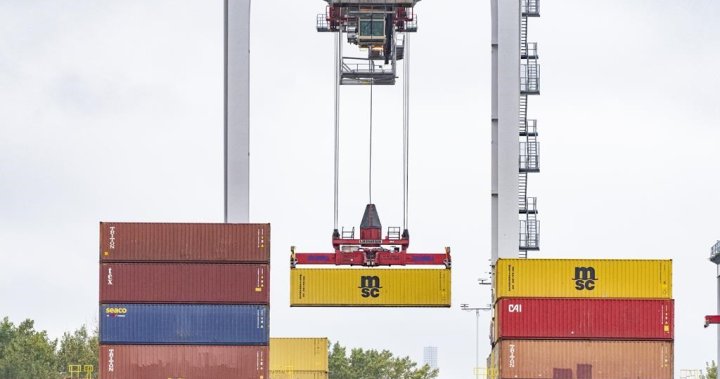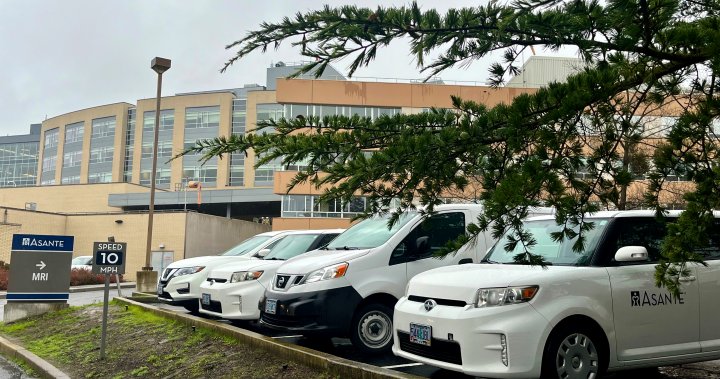Shippers and producers are holding their breath ahead of a possible strike by thousands of railworkers this month that would halt freight traffic, clog ports and disrupt industries.
“The railways are two ribbons that go east to west, and there’s not much alternative if you cut those two ribbons,” said John Corey, president of the Freight Management Association of Canada, whose members include port authorities, manufacturers and other large shippers such as retailers Canadian Tire and Home Depot.
“The ports become useless. Nothing moves anywhere.”
Canadian railways haul more than $350 billion worth of goods and more than half of the country’s total exports each year, according to the Railway Association of Canada.
Anxiety over a strike by some 9,300 employees at Canadian National Railway Co. and Canadian Pacific Kansas City Ltd. already cost the companies business after customers sought to reroute cargo in recent months following approval of a strike mandate by union members in May.

Then-labour minister Seamus O’Regan, in an apparent move to delay the disruption, asked the country’s labour board to review whether a work stoppage would jeopardize Canadians’ health and safety.
The email you need for the day’s
top news stories from Canada and around the world.

Get daily National news
Get the day’s top news, political, economic, and current affairs headlines, delivered to your inbox once a day.
The Canada Industrial Relations Board is examining whether there are critical shipments — chlorine for water and gasoline for cities, for example — that must continue in the event of job action, putting any potential work stoppage on pause until a ruling is made.
Either way, observers says the possibility of a strike will likely remain on the table after the decision — expected this Friday — as players in industries ranging from agriculture to big-box retail fret over the fallout.
“By kicking it down the road, all he did was really increase the uncertainty,” said Corey, referring to the former labour minister’s move. “Now nobody knows what’s going to happen, and uncertainty is bad for business.”
O’Regan’s replacement as federal labour minister, Steven MacKinnon, met Monday morning with leaders from the two main railways and the Teamsters Canada Rail Conference union to discuss the consequences for the economy and supply chain.
In a phone interview Friday, MacKinnon said the parties have failed to treat the issue with “sufficient urgency,” noting that talks have all but broken down over the past few weeks.
The minister, who stepped into the role barely two weeks ago when O’Regan resigned from cabinet, suggested that the two sides need to hash out a deal themselves rather than relying on government intervention, such as back-to-work legislation.
“The approach that we have found that works is where parties reach agreement at the bargaining table. Those provide the most enduring benefits to employers, to employees and the most satisfactory outcomes. And that is our plan in this case,” MacKinnon said.

All parties say they want to continue negotiating, but each blames the other side for the communication breakdown. CN and CPKC are bargaining separately with the Teamsters union toward distinct collective agreements, though two strikes could happen simultaneously.
“Our members are growing increasingly frustrated and impatient with CN and CPKC. It’s up to both companies to return with reasonable proposals,” Teamsters spokesman Christopher Monette said in an email.
The stumbling blocks are crew scheduling, fatigue management and safety, he said. The union has rejected binding arbitration with both companies.
The railways framed the impasse differently.
“We’ve proposed three different options to the union, which has refused to bargain and has just presented us with more demands,” said CN spokesman Jonathan Abecassis in a phone interview.
“We want a resolution to this conflict. That’s what we’re hopeful that all of this will lead to.”
The government’s move to hand the issue to the labour board has “just perpetuated the uncertainty,” he added.
CPKC said the fall, when millions tonnes of grain and consumer products roll to market, marks a period of peak shipping demand.
© 2024 The Canadian Press





